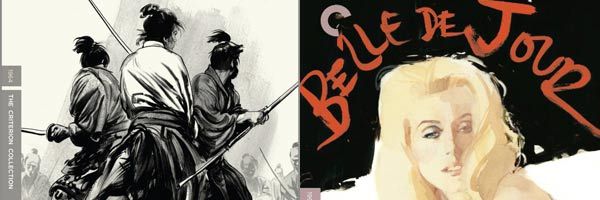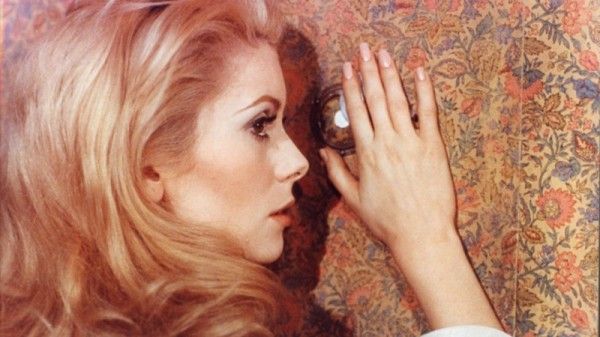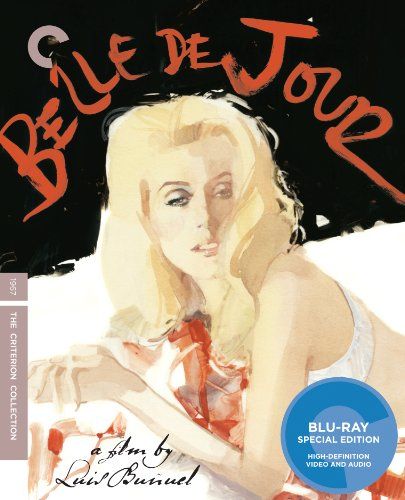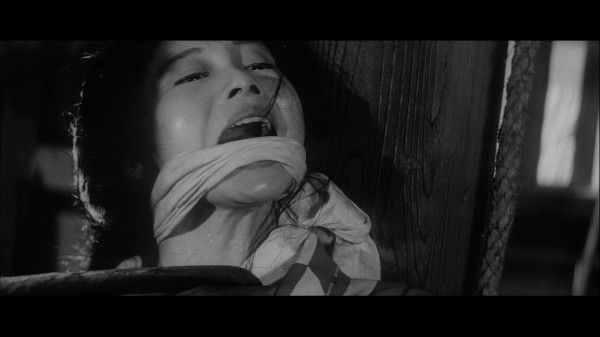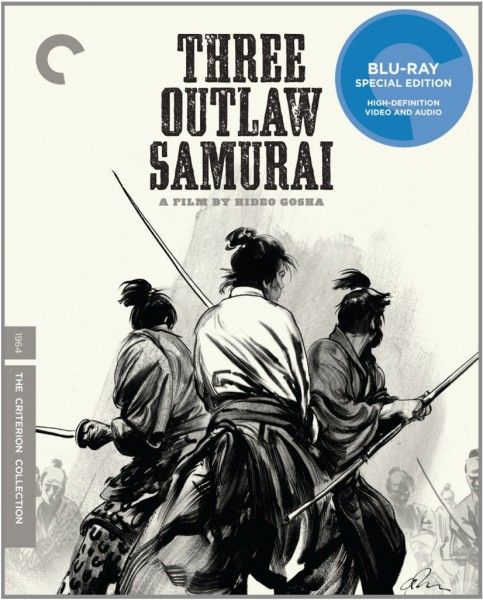One of the great things about The Criterion Collection is that they often release masterpieces you’ve never heard of. Hideo Gosha’s Three Outlaw Samurai is a thoroughly entertaining film about three unlikely compatriots forced to band together against a feudal lord. And then there are the classics that everyone’s heard of. In this case it’s Luis Bunuel’s Belle de Jour, which stars Catherine Deneuve as a wife who fantasizes about being a prostitute. Both are on Blu-ray and our reviews follow after the jump.
For Belle De Jour, Bunuel starts the film in a dream sequence where Séverine Serizy (Deneuve) is being whipped and tortured. She wakes up in bed with her husband and is frustrated that it was only a dream. A friend of the family mentions a house of ill repute, and Séverine is drawn to it, and so she becomess a prostitute under the alias Belle De Jour. She needs to know what it’s like, and as a stay at home wife it gives her something to do. Her initiation into prostitution is awkward, as many of the people have certain sexual rituals that must be obeyed when being serviced. But Séverine is the one who can handle some of the more odd requests. And what she finds out is that she likes it. But how can she live a bifurcated life when a gangster decides he wants her all to himself?
Eroticism is tricky business. It’s hard to know if Quentin Tarantino gets a boner looking at women’s feet, but as cinema’s most famous foot fetishist, what may turn him on may not work for everyone. Bunuel’s great gift here is that he creates enough space for us to not judge or know precisely what is happening when Séverine is servicing her clients. There may be some blood afterwards (at least in one case), but we can see that the character is freed through these acts. Bunuel knows that guilt and the thrill of exploring the forbidden is part of most people’s sexuality.
He also knows how to make a film about sex that doesn’t feel exploitative. Deneuve – one of cinema’s most attractive ice queens – is never fully naked and the monetary aspects are kept mostly off screen, it’s not about that. This isn’t about her as a “whore” and the societal implications of the sex industry, it’s about the power that a deep desire can have over a person. But because it’s sex, it doesn’t have the draggy overwhelming moral elements that often comes with addiction narratives– perhaps the period allows us to appreciate that Deneuve’s character can’t say to her husband or polite society that she wants nothing more than to be a bottom. But so much of the film is up to the viewer: if you want to judge the main character harshly for what she’s doing, the film can still be appreciated.
Bunuel is one of the great masters, and with all films that deal with sex and sexuality there is the fear of the sort of potholes that come with such subject matter. Thankfully, it’s a complete thought, and a brilliant work on desire that transcends the petty aspects of simplistic morality. It’s a stunning work that is as daring and exciting as it must have been when it was released in 1967.
Criterion presents Belle de Jour in widescreen (1.66:1) and in 1.0 mono. The powdery look of the film is perfectly conveyed. It’s filmic, but not too grainy. The film comes with a commentary by Professor Michael Wood that speaks well about the film and its director. The supplements include “That Obscure Source of Desire” (18 min.) which gets feminists to talk about the film, while the screenwriter Jean-Calude Carriere (10 min.) gets an interview to talk about the making of the film and Bunuel. “Cinema” (7 min.) offers Carriere and Deneuve on set, and three trailers – two for the film’s release and one for its reissue – are also included.
Three Outlaw Samurai begins quickly. Some farmers have kidnapped the daughter of the magistrate in hopes of getting their taxes lowered. The peasants can’t survive and were drawn to desperate measures. Sakon Shiba (Tetsuro Tamba) is a ronin looking for a place to sleep. He breaks into the hut they’re hiding in, and tells them that he’s going to sleep there. They threaten him, but he’s way too badass to be worried about it. He then also instructs them how to handle their kidnapping. When the magistrate’s guards show up, he also coaches the peasants on how to fight them off, which gets the attention of the guards, who then start threatening him. So he joins up with the peasants.
Then we’re introduced to Einosuke Kukyo (Mikijiro Hira), who works for the magistrate. He hears of what’s going on, but doesn’t want to concern himself because killing a handful of peasants in beneath him. Instead the lord’s take some prisoners, including Kyojuro Sakura (Isamu Nagato). At first he has no problems working for the magistrate and kills a man without question, but once he realizes what the peasants are fighting for he changes allegiances and works with Shiba. When the magistrate claims he will leave the peasants alone if they return his daughter, Shiba agrees to the deal, but the magistrate reneges on his promise, and it allows the three samurai to work together to fight him.
There’s much more to the film, and a love interest and a missing scroll that factor into the film, but in all likelihood this release by Criterion is something of a surprise. Its director Hideo Gosha never got the same sort of attention of a filmmaker like Akira Kurosawa outside of his country, and so his work has never had the same sort of western appraisal. Though his next film Sword of the Beast has been issued by Criterion, likely this is the first most have heard of this movie.
And if you like samurai movies this release launches Three Outlaw Samurai into the upper echelon of bad ass films, and great action movies in general. Like L.A. Confidential years later, it sets up the idea of three great warriors, and then has them bounce off each other as friends and foes. When the three come together at the end, it’s the sort of thing that gets the adrenaline going. Sure, from the title you know who it’s about, but building to that moment where the three are working together is a “fuck yeah!” moment. And when the action scenes hit, Gosha has a great idea and knows how to use economy to make the fight scenes kick ass.
This is the sort of film that is worth a blind buy - it’s worth diving into, and it’s the sort of film that holds up under repeat viewings (I’ve now watched it twice). It’s like finding a hidden gem by Charles Bronson, or a great unheralded Sam Peckinpah or John Woo movie. This is a great film, and well worth checking out.
Criterion presents the film in widescreen (2.35:1) and in 1.0 Mono. The transfer is extraordinary, though it’s hard to gauge as the film has never been properly released stateside. Alas, the only supplement for the film is a trailer.

